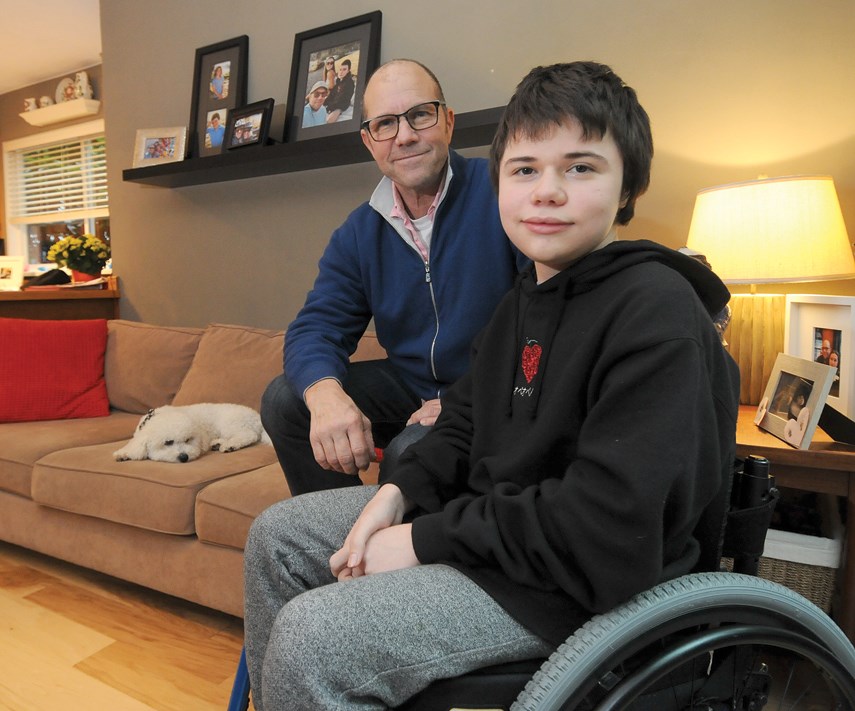Dealing with COVID-19 and the isolation that has come with it has been hard on most North Shore families.
But for Brad and Skyler Stringer of North Vancouver, the pandemic has heaped a new layer of challenges on a family that has already had far more than its share of hard luck.
Like many teens, Skyler, 18, loves playing video games. He also has a passion for Japanese anime and manga comic books, and he enjoys baking.
Skyler also has Duchenne muscular dystrophy, a progressive and degenerative neuromuscular disease that affects about one in 5,000 boys.
Skyler’s parents first noticed something wasn’t right around the time he started elementary school. At six, “He couldn’t climb the jungle gyms and run around as fast as his friends,” said Skyler’s dad, Brad.
They took Skyler to doctors, who did tests and confirmed a diagnosis of muscular dystrophy. Skyler would eventually lose his ability to walk and would likely be in a wheelchair by the time he was in his early teens, doctors said.
Skyler started to attend the neuromuscular clinic at B.C. Children’s Hospital, where the family, including mom Jasmine and sister Jade, began their journey of learning about Skyler’s illness.
Primarily a muscle-wasting disease, in muscular dystrophy, muscle is progressively replaced by fat cells and scar tissue. The disease usually starts in the legs, and works its way into the arms, shoulders and trunk. Eventually, the diaphragm – which controls breathing – and the heart – another muscle – are also impacted.
In Skyler’s case, for many years he was faring better than other children with the same diagnosis.
And although there is no cure for muscular dystrophy, there are drugs that can help – including steroid-like anti-inflammatory medications that slow down the muscle wasting and keep kids mobile longer. The side effect of the drugs, however, is to essentially keep a teen's growth rate very slow.
As a result, most boys with Duchenne muscular dystrophy look far younger than their years.
“We figured it was well worth the trade-off,” said Brad.
In 2019, more heartbreak struck the family – Skyler’s mother, Jasmine (by then divorced from Brad), died from breast cancer. Her loss had a deep impact on both Skyler and his sister.
Almost unimaginably, death from cancer was a scenario that would also be repeated with Brad’s second wife, Diana.
School provided stability
Throughout the years of loss and hospital visits, school was one place that felt relatively safe for Skyler.
There were challenges as well, said Brad – especially when Skyler’s peers began rapidly growing and taking part in sports.
But for Skyler, going to class at Ecole Argyle Secondary, hanging out with friends at lunch and walking to the corner store with other kids were touchstones of routine and normalcy. “I wasn’t just sitting at home,” said Skyler.
Then came COVID, changing everything, almost overnight when Skyler was in Grade 11. As schools pivoted to online learning, “I was less active,” said Skyler.
“I wasn’t really doing that much.”
COVID has been a double threat to Skyler, said Brad. With muscular dystrophy, which can impact the respiratory system and the heart, any illness that can damage those organs is especially concerning.
Skyler was enrolled in the school district’s hospital homebound program. But because of COVID protocols, it wasn’t possible for teachers to come to their home to help.
Meanwhile, Skyler struggled with online learning and eventually stopped.
It was hard on the teen when his friends graduated high school without him.
This year, Skyler is back trying school again, with a mix of online learning and support from teachers at Mountainside Secondary two days a week. That’s been “amazing” said Brad. A respite worker also comes to their home where she and Skyler play cards and cook together.
But meanwhile, Skyler’s physical strength has been failing.
After beating the odds for years, Skyler is now using a wheelchair to get around.
But with that comes more logistical challenges – particularly in an older home not built to be wheelchair accessible.
Wheelchair access a challenge in older home
Brad said his focus now is figuring out how to pay for needed renovations to his North Vancouver home to make the bathroom and shower wheelchair accessible. A wheelchair-accessible van will also soon be needed.
Some funding is available from Muscular Dystrophy Canada and Brad is working with North Vancouver MLA Susie Chant’s office to access more resources. But many funding agencies have seen their funding impacted by COVID, said Stringer.
As a funder of last resort, Muscular Dystrophy Canada requires families to seek out other funding. Often, that can feel overwhelming, said Brad.
As a bus driver, Brad said he doesn’t qualify for many income-tested programs.
To help out, a GoFundMe page has been started for the family, which Brad hopes will fill some of the financial gap.
“Right now, the main thing is, I just want to make his world as comfortable for him as possible and give him as much dignity as possible, and the ability to be more self-sufficient.”



